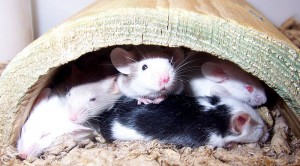Podcast: Play in new window
BOB HIRSHON (host):
Of mice and autism.I’m Bob Hirshon and this is Science Update.

Scientists at the University of Washington have reversed autistic-like behaviors in mice by giving them a drug normally used to treat seizures. Social deficits and repetitive behaviors are characteristic of autism in humans. BTBR mice have genetic mutations that cause similar behaviors. But pharmacologists Sun Han and William Catterall found that 30 minutes after administering a low dose of the drug clonazepam to these mice, their autistic-like behaviors ceased. Catterall explains.
WILLIAM CATTERALL (University of Washington):
We were able to reverse the autistic-like behaviors and generate more normal mouse behavior with a single dose injection of this drug.
HIRSHON:
The researchers think the drug acts by restoring the right balance of electrical activity in the brain. They hope to conduct clinical trials with autistic teens soon, but caution that humans are more complicated than mice, and the causes of autism are not yet fully understood. I’m Bob Hirshon, for AAAS, the science society.
